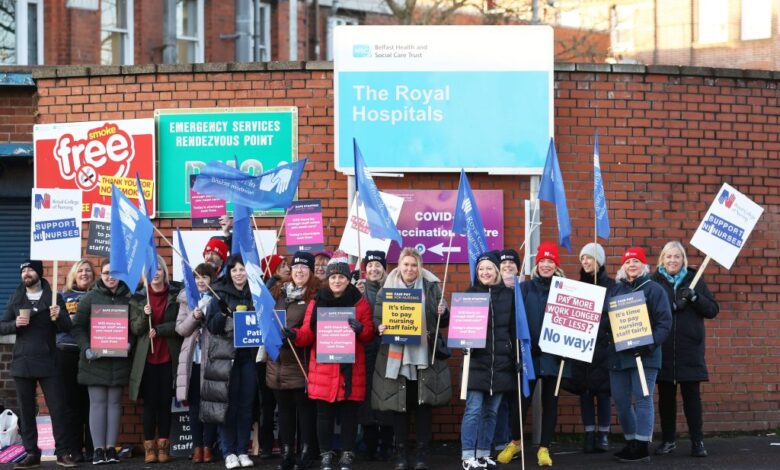RCN calls strike action in Northern Ireland over pay stalemate

The Royal College of Nursing (RCN) has announced that its members in Northern Ireland will this month strike again in protest of the ongoing lack of a pay deal in the country.
Members of the union will join other public sector workers in a day of mass industrial action on 18 January as they fight for pay parity with their other UK colleagues.
This is the first time RCN members have been called to take strike action in Northern Ireland since December 2022.
“It is nothing short of immoral that we have been put in this position once again and are the lowest paid nursing staff in the UK”
Rita Devlin
They will join other nursing and midwifery colleagues belonging to Unison and the Royal College of Midwives who will also be striking on 18 January.
It comes as Health and Social Care (HSC) staff are still without a pay deal for 2023-24, or an improved offer for 2022-23.
This means that nurses in Northern Ireland are the lowest paid of their public sector counterparts in the rest the UK.
Progress on a deal has been hampered for almost two years due to the collapse of power-sharing arrangements in Northern Ireland.
The Democratic Unionist Party (DUP) has been boycotting Stormont since February 2022 in defiance of post-Brexit policies affecting Northern Ireland.
This is the second time in recent years that nurses in Northern Ireland have fallen out of pay parity with their UK colleagues amid a collapse of Stormont.
Strikes by nurses back in 2019-20 successfully resolved the situation then.
However, nurses in Northern Ireland have now once again fallen out of pay parity.
The RCN held a strike in December 2022 in response, and a letter sent by the union today to Northern Ireland secretary in Westminster, Chris Heaton-Harris, showed members had renewed appetite for industrial action.
Rita Devlin, director of the RCN in Northern Ireland, said: “It has been four years since nurses in Northern Ireland first took strike action to ensure pay parity with colleagues in England and Wales.
“It is nothing short of immoral that we have been put in this position once again and are the lowest paid nursing staff in the UK.
“What an indictment on how we treat health care workers and the value we place on them.”
Ms Devlin warned that low pay was making it “very difficult” to retain nursing staff in HSC services and that the college was “not willing to tolerate this any longer”.
She added: “Patients and staff are suffering every single day due to the lack of political movement which not only affects pay but prevents the transformation of services that has been needed for years.
“We have no choice but to take further action.”
Due to the lack of a fully functioning government, Mr Heaton-Harris was responsible for setting the country’s 2023-24 budget.
As a result of his budgetary decisions, the Department of Health in Northern Ireland announced that it would be unable to make a pay offer to HSC staff.
Before Christmas, Mr Heaton-Harris had put forward a financial package worth more than £3bn for the country, which included money to cover public-sector pay, on the condition that the political parties restore Stormont. However, the deal has not yet been accepted.
A spokesperson for the Department in Northern Ireland reiterated that the 2023-24 budget “provided no scope for a pay offer to be tabled for this year”.
They said: “This is not a sustainable situation.
“The department continues to do all it can to be able to make a fair pay offer to health and social care staff.”
Meanwhile, a Northern Ireland Office spokesperson said Mr Heaton-Harris had “expressed his disappointment” that a new executive was not up and running, despite talks taking place between the political parties.
They said: “This package is on the table and will remain there, available on day one of an incoming Northern Ireland executive to take up.
“It is now for the [Northern Ireland] parties to come together, restore the executive and begin to address the challenges facing the people of Northern Ireland, including public sector pay.”
Parties in Northern Ireland have stepped out in support of fair pay for HSC staff.
First minister designate Michelle O’Neill, from Sinn Fein, wrote to the RCN today to express her continued support for fair pay for HSC staff.
She said: “I am committed to getting an executive established so we can get on with dealing with the challenges facing health and social care.
“That includes pay and conditions, tackling lengthy waiting lists, recruiting more doctors and nurses and funding vital health and other essential public services.”
Ms O’Neill argued that, in the absence of an executive, Mr Heaton-Harris should “move immediately to implement fair pay rises” for all HSC staff.
In addition, the Ulster Unionist Party health spokesperson, Alan Chambers, said: “Our party position is that we believe that the established and agreed commitment regarding pay parity should be honoured.
“However, until there is a return of an assembly and an executive, this is out of our hands.
“This situation can only be changed if the DUP decide on an immediate return to Stormont.”
Meanwhile, a DUP spokesperson said that the party “fully supports the principle of pay parity between health and social care staff in Great Britain and Northern Ireland”.
They added: “We want to see nurses, doctors and other vital public servants receive a fair pay award which can not only be delivered for this financial year, but on the basis that NI has sustainable financial resources to ensure that fair pay can also be delivered in future years as well.”






